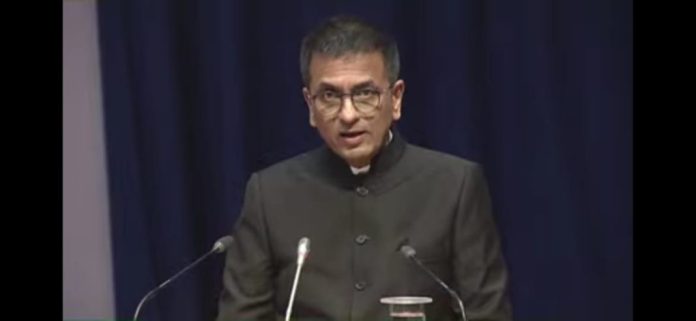As the 50th Chief Justice of India DY Chandrachud completes one year in office tomorrow, India Legal takes a look at some of the path-breaking initiatives taken by him as well as his landmark achievements during the period.
Dr. Chandrachud took over as the 50th CJI on November 9, 2022. Under his pioneering leadership, the Supreme Court witnessed the introduction of several initiatives, including the adoption of cutting-edge technology, which made the court premises more accessible and inclusive.
The introduction of litigant-friendly facilities includes Hybrid hearing system, upgradation of Integrated Case Management System (ICMIS) for a more efficient advanced legal ecosystem, introduction of online RTI portal, accessibility to judgments (e-SCR) in translated forms in various regional languages, with over 36,000 Judgments now available on eSCR and the
establishment of an e-Sewa Kendra.
In line with the commitment to safeguard the environment and reduce carbon footprint by minimising usage of paper, initiatives such as Advocates’ online appearance portal, paperless filing, and e-Office remained the focus of the Registry functioning under the guidance of CJI Chandrachud.
From its launch on May 12, 2023 till October 19, as many as 9,913 fresh filings have been made using the new e-Filing module in a variety of matters and the e-Sewa Kendra has attended to more than 2,400 queries since its inception.
To further achieve the digitisation goals, the e-Copying module has been designed and developed for bringing speed and efficacy in obtaining certified copies in the Supreme Court of India. Every month around 5,500 Letter Petitions and 10,000 e-mails are received in the PIL English section that are now digitally processed.
To complete the circle of transparency and accountability, Supreme Court onboarded its case
data on National Judicial Data Grid (NJDG) on September 14, 2023. The Supreme Court of India has entered into an MoU with IIT Madras to facilitate the digital transformation of the Indian judiciary.
Further, for the convenience of visitors and the public, Su-Swagatam Portal has been launched for the creation of an e-entry pass. As of 18.10.2023, as many as 69,236 visitors passes have been issued through the portal.
The Additional building complex, which was recently built, now has facilities such as Training cum Examination Centre, Yoga and Recreational Hall, Health and Wellness and an upcoming Creche. New Canteen facility for advocates and litigants was inaugurated on 05th October, 2023.
To ensure holistic welfare of the staff, the Supreme Court under the guidance of the Chief Justice of India, Dr Justice Dhananjaya Y Chandrachud organised 12 sports and 9 cultural events in which over 970 court employees participated.
The Judges library has been modernised and digitalised with required infrastructure. A 6 feet high beautiful sculpture ‘Goddess of Justice’ has been installed inside Judges Library. Soli Sorabjee’s Bibliotheca was also inaugurated by the Chief Justice of India on the Second floor of the new Judges Library.
It has books from the personal collection of Mr. Sorabjee which was given by his family to the Judges Library.
In a significant step towards a gender just legal order, the Supreme Court of India launched a “Handbook on Combating Gender Stereotypes” aimed at eradicating gender stereotypes from judicial discourse.
Supreme Court, under the directions of Hon’ble the Chief Justice of India, Dr. Dhananjaya Y. Chandrachud, took the lead towards inclusion of LGBTQIA + Community within the Supreme Court premises. Universal Rest Rooms were created at different locations in the main building as well as the Additional Building Complex of the Supreme Court. Online appearance portal launched earlier this year was also made gender neutral. 96 new sanitary napkin vending machines and 14 incinerators have also been installed in all the ladies washrooms in the
supreme court premises.
Fresh appointments have been undertaken by the recruitment cell through open examination, departmental test, deputation and compassionate appointments to fill up the vacancies and augment the staff strength at the Apex Court.
The Chief Justice of India, Dr. Dhananjaya Y. Chandrachud being a harbinger of personal liberty directed listing of 10 transfer petitions everyday along with 10 Bail applications before each Court.
Now a new mechanism is devised and every day of the week is reserved for addressing cases relating to specific categories ranging from Criminal matters, MACT matters, Arbitration matters, etc. A new system of mentioning matters has been introduced, thereby ensuring that all urgent matters be mentioned timely before the Court.
In light of the steps taken by the Chief Justice of India despite inheriting 69,647 cases on November 9, 2022 and despite unusual heavy filing on more than 51,384 cases during the
interregnum period, the pendency as on October 20, 2023 is 70,754 i.e., the cases pending in the Supreme Court has not increased much.
The tenure of the CJI is also marked by his global imprint.
The Chief Justice of India headed the Indian Delegation for the 18th meeting of Chief Justice/Chairpersons of the Supreme Courts of the Shanghai Cooperation Organisation at New Delhi with an aim to foster effective judicial cooperation among Member States.
Dr Chandrachud participated in several International Conferences and meetings such as Cambridge Pro Bono Project (CPP), Faculty of Law, University of Cambridge; Edinburgh Law School, University of Edinburgh; Bonavero Institute of Human Rights at the University of Oxford, United Kingdom ; Brandeis University, Massachusetts, USA ; Georgetown Law University, Washington DC, USA.
The Chief Justice also visited Harvard Law School, Cambridge, where he was felicitated with an ‘Award for Global Leadership’ by Harvard Law School Centre on Legal Profession. The CJI also attended the opening of the Legal Year at Westminster Abbey, London.
He also headed the Indian delegation for the inaugural Singapore-India Roundtable organised by the Supreme Court of Singapore in September, 2023 and delivered a lecture on the “Seven decades of the Indian Constitution: The Life of a Nation” at the Singapore Academy of Law.


